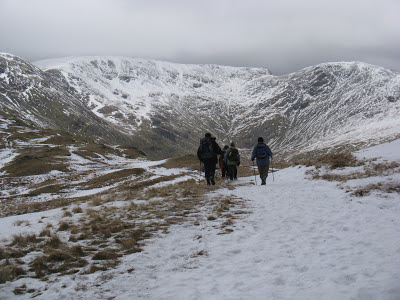I had the afternoon off yesterday and I decided to pop down to the waterfront to check out two very interesting exhibitions by women painters.
First it was off to
Tate Liverpool to see the work of Sylvia Sleigh who was part of the art scene in 1960s New York. She paints a lot of nudes, both male and female, in great realistic detail (but less meaty than say,
Lucien Freud), but what I really loved were the vibrant backgrounds offsetting the figures. Her interiors are full of either lush greenery, or rich and colourful fabrics, gorgeously rendered. I will admit to perhaps spending more time admiring her sofas than her subjects; at any rate encountering an entire room of her paintings is quite a sensation. The exhibit runs until the end of May, it's free and I'll be making several return visits. You can see more info
here (just a warning, this link to the Tate Museum is somewhat full on).
Then I visited the nearby
Museum of Liverpool to see their
Beryl Bainbridge exhibit, also free. I've read several of Bainbridge's novels, but two things I didn't previously know about her were that she was born and bred in Liverpool, and that she was also a painter.
The image on
this new biography by her close friend
Psiche Hughes, who also helped to organize the exhibition, shows one of several of Bainbridge's paintings that were obsessed with Napoleon. What I also found fascinating was the number of works that related directly to her novels. There were several quite haunting paintings of both the Titanic (her novel
Every Man For Himself is set on the tragic boat), and Scott's doomed Antarctic expedition (fictionalized in
The Birthday Boys). Her work is full of quirkiness and interesting layers of colours, paint on drawings, and even collage.
All of the Bainbridge novels I've read, including the two mentioned above, have been her historical novels. I've now started on her earlier books that are more autobiographical. I just finished
Harriet Said..., which is set in Formby, just a few miles north of Liverpool. It's a very disturbing novel about two girls of thirteen who, bored during their summer vacation, taunt an older unhappily married man nicknamed the Tsar with tragic results. In its evocation of very common teenage emotions - peer pressure, jealousy, rage, helplessness, self-importance, and a fascinated curiosity, mixed with revulsion, about sex - her writing is direct, blunt and non judgemental, and all the more powerful for those qualities. It's an uneasy read, but a very good portrayal of the escalation of how small events and actions nudge ever so slowly and uncontrollably towards something far more sinister and sad.
Next up will be
A Weekend With Claude, about a group of friends and what happens during one weekend in the country. A painting will feature in the novel - also on display at the Museum of Liverpool, where the exhibit runs until April. I'm also looking forward to reading
An Awfully Big Adventure, which is based on her memories working at the Liverpool Playhouse. There was a very good film made of this novel several years ago with
Hugh Grant (playing very against type - he's quite marvellous in this) and
Alan Rickman (always worth seeing in just about anything!).



































